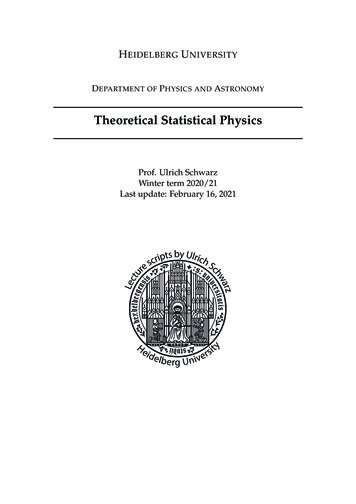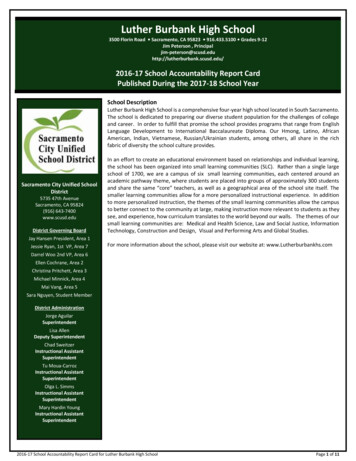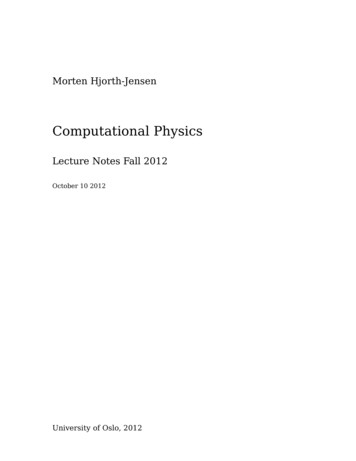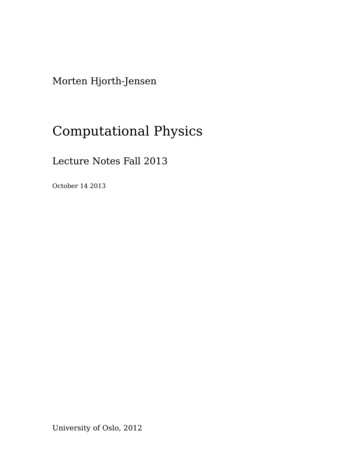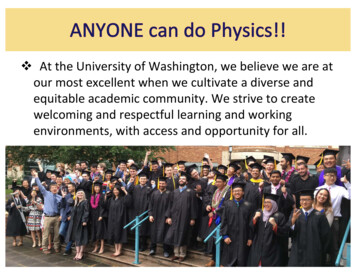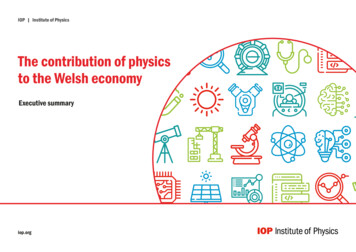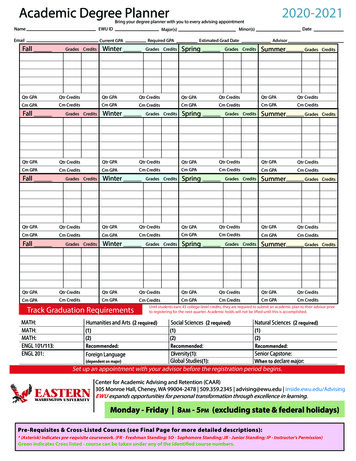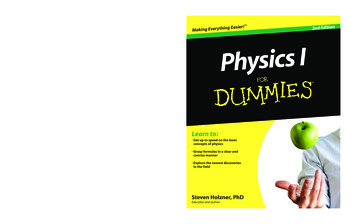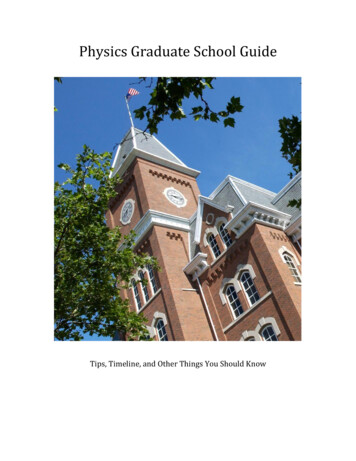
Transcription
Physics Graduate School GuideTips, Timeline, and Other Things You Should Know
Table of ContentsWhat You Should Know Before You Apply .page 3Timeline . .page 4Required Materials .page 5Frequently Asked Questions . page 7Advice from Current Graduate Students .page 82
Part 1: What You Should Know Before You ApplyYou’re considering graduate school. That’s great! Before applying, it is important tounderstand your personal reasons for wanting to go to graduate school. Also, do you knowwhat to expect financially? Do you know how long it will take to finish a Master’s degree orPh.D.? Do you know how many weekly hours you will need to put in? These are questionsyou should know the answers to before committing to a 2-7 year decision.Common reasons for going to graduate school1. Higher starting salary. This is a popular reason for going to graduate school, but itshould not be the only reason. You should also do your research to figure out justhow much a graduate degree will increase your starting salary.2. Advance your career. A graduate degree can open a wider range of careeropportunities, but this is not necessarily true for all fields.3. Enhance your education. Graduate schools can provide opportunities to exploreadvanced topics in a particular field.4. Get research opportunities. Even if you do not get to explore your own theories,there are other opportunities to participate in funded research.5. You want a career where you are leading and doing your own research.6. You want to teach at the university level7. Free tuition. In some cases, graduate programs might not only waive your tuition,but also give you a stipend to cover living expenses in return for working as ateaching or research assistant.Common reasons for not to going to graduate school1. Highly competitive. Graduate programs always have fewer spots thanundergraduate programs. Additionally, there is competition for research positionsand funding.2. Stressful and time-consuming. Completing a graduate degree, especially a Ph.D.,requires emotional maturity. Also, keep in mind that completing a master’s degreecan take 2-3 years and a Ph.D. can take 5-7.3. No guarantee of higher salary. Getting a graduate degree does not necessarily meanyou will be offered a job with a much higher salary than you are getting now.4. Return on investment may be slow. Even with a higher salary, how quickly will thatoffset tuition loans and negative cash flow due to not earning much money while inschool?5. Limited job opportunities. If the degree you get is in an academic field, finding workoutside of teaching or research may be difficult and not necessarily worth it to you.6. Too qualified. When looking for employment, having an advanced degree cansometimes be a liability. You might be told you are overqualified.If you are unsure about graduate school, consider spending a few years getting relevantwork experience first. This will give you more time to consider whether it is the rightchoice for you. Additionally, you could use this time to save money to help cover costs.3
Part 2: TimelineSophomore Year: You should get involved in research during your sophomore year if youhaven’t already. You’ll need research experience to be competitive for graduate schooladmissions. Physics 2095 can help you explore research options or you can talk to aphysics advisor.Junior Year: You should begin learning about different schools and start making a list of 10 that you’d be interested in applying to. This list should include “dream schools”,“safety schools”, and a few in-between. Your professors, physics faculty advisor, andresearch advisors can provide recommendations and insight about appropriate schools.Additionally, gradschoolshopper.com is a great resource to help you search for schools thatoffer programs in the field you intend to study.Summer:1. Take the General GRE - The summer between your junior and senior year is a great timeto take the General GRE. The General GRE is offered several times per year, however, so it’spossible to take it spring of your junior year or autumn of your senior year if that worksbetter for you.2. Begin studying for the Physics GRE.3. Continue to think about the graduate schools you’d like to apply to. Each school has anapplication fee which may limit the number you’re willing to apply to.Senior Year: In addition to taking the Physics GRE in September or October, you shouldbegin contacting those who you think will write a strong letter of recommendation for you.You’ll also begin writing your personal statement to go along with your graduate schoolapplication. Additional information about letters of recommendation and personalstatements is provided in the next section.4
Part 3: Required MaterialsWhen to ApplyYou should plan to submit your application 8-10 months prior to beginning the graduateprogram. The deadline to submit a graduate school application varies by university. Someschools have a deadline as early as December 1st while others are as late as early March.Application deadlines can usually be found on the website of the program to which you areapplying. Please note that most schools admit students to begin their program in the fall.Rarely can students begin a physics graduate program during the summer or spring term.Required MaterialsPhysics GRE - The Physics GRE is a paper test offered three times per year (April,September, and October) and it covers a wide range of physics topics. The test is threehours long and consists of 100 multiple-choice questions. Calculators are not allowed.Most students take the test September or October of their senior year. While you can takeboth the September and October tests, keep in mind that your results from the Septembertest will NOT be available until after registration for the October test closes. Rarely dostudents take the April test since it is too early to take junior year and too late to takesenior year unless you’re going to take time off before starting graduate school.You can find a breakdown of topics and sample tests on the OSU Physics website:physics.osu.edu/physics greAdditionally, Physics GRE guides can be purchased from a bookstore or Amazon and canhelp you to be more prepared for the test.Please note that not all physics graduate programs require the physics GRE for admission.General GRE - This is comprised of three sections: Verbal Reasoning Quantitative Reasoning Analytical WritingAdditional information can be found at www.ets.org/gre/revised general/about.Please note that not all physics graduate programs require the General GRE for admission.Letters of Recommendation - most graduate programs require 2-3 letters ofrecommendation. It’s preferred that the letters come from people who can speak aboutyour research experience and skills. If you worked more closely in the lab with a graduate5
student, post-doc, or staff member, you may ask them to provide the letter instead of afaculty member. Letters from a professor you’ve had in class are acceptable, but are not asstrongly weighted as a letter from someone who has supervised your research.The letter writer should know you well enough to be able to discuss the following: Intellectual characteristics (intelligence, creativity, work ethic, problem solvingskills, academic background, etc.) Knowledge of the field Communication skills Ability to succeed in graduate school Ability to work independently and stay motivatedFor additional advice, please read the Requesting Letters of Recommendation Guideavailable atwww.physics.ohio-state.edu/undergrad/Letters of Recommendation.pdfPersonal Statement – This is your opportunity to tell the admissions committee why youwant to go to graduate school. The OSU Writing Center (4th floor Smith Lab) has a usefulhandout for helping you write your personal statement available ndouts/Personal%20Statement.pdfTranscript – Graduate admissions committees will need a transcript from all colleges anduniversities you’ve attended since you graduated from high school. Directions forobtaining an official transcript from Ohio State can be found on the Registrar’s Website atregistrar.osu.edu/alumni/index transcript.asp6
Part 4: Frequently Asked QuestionsQ: How does funding work?A: Most physics graduate programs offer tuition support. For students on the Ph.D. track,most schools offer support in the form of Graduate Assistant positions (graduate teachingassociate, graduate research associate, or fellowship). External scholarships (like theNational Science Foundation) are also available. Some programs offer 9 months of supportwhile others offer 12 months.Q: How important are my GRE test scores?A: Schools and professors vary widely in how much weight they put on standardized tests,therefore it is important to check a school’s webpage for information about theirrequirements. If you feel your test scores are lower than what the school typicallyaddresses, make sure to address that in your personal statement.Q: How important are my grades?A: In general, graduate admissions committees want to see a B or higher in your physicsand math courses. If you’re pursuing theory, then your grades should be higher than this.If you earned lower grades during a certain term, you should address that in your personalstatement.Q: How do I make myself stand out in my personal statement?A: Committees want to read about your background and your interest in the field to whichyou are applying. Mention the school you’re applying to by name in your personalstatement. Do not talk about your childhood fascination about how the world works, etc.,but do mention professors you’d be interested in working with. This takes time to figureout, but it’ll show the committee that you’ve done your homework and are serious aboutstudying there.Q: Should I address academic issues/difficulties in my personal statement?A: If you have a lower GPA or test scores, you should address it in your personal statement.Write about what you’ve learned from that experience. Committee members are lookingfor applicants with realistic self-appraisal and maturity, but they do not want to readexcuses.Q: How do I effectively describe my research experience in my personal statement?A: Include details about the research you’ve done, including equipment you’ve worked withand programs you’ve used. Also include what you’ve learned from your research. This iswhat the committee wants to read about the most.7
Part 5: Advice from Current Graduate StudentsStudying Reading the textbook isn’t enough – have a pad and pencil out and sketch equations,derivations, notes to yourself, etc. as you read. Check out other course textbooks, often they’ll have alternative explanations; justbecause your class is using Griffiths or Taylor doesn’t mean it’s necessarily the bestbook for you (check out bookzz.org for pdfs of physics/math textbooks!). Ask for help! Anecdotally speaking, there’s rampant impostor syndrome amongundergraduate physics majors and everybody’s faking it to some degree – don’tsuffer in silence. Take a good amount of math classes – you’ll be thankful in grad schoolo Partial Differential Equationso Complex analysiso Linear algebrao Group theory (if you’re a theorist, especially particles)Finding MentorsFind someone you can go and talk to about anything related to your academic experience—from how research is going to how you feel as a woman in science. This can be the sameperson as your research advisor, but can also be an older grad student, an older undergrad,etc. Having this contact will be absolutely critical throughout your education process.Research Get involved in research early. You don’t have to be involved in major ways, but youcan start with working 3-4 hours per week in the lab. This also helps you build astrong graduate school application. Research is no longer a bonus but is now a requirement for graduate school, so getas much experience as you can! Research Experience for Undergraduates (REU) programs are competitive butthey’re still one of the best avenues for dipping your toes in research. These areoften “all-inclusive” programs that provide housing, food, and a monthly stipend. Make sure to take advantage of any research scholarship or fellowship programsyour university offers over the summer. You don’t need to know exactly what project you’ll pursue in graduate school, butyou should have some idea which subfield in physics you’re interested in and why.This is where having multiple research experiences come in handy and the earlieryou get started – the more time you’ll have to explore. Find a research advisor who will encourage you to attend conferences and connectyou to collaborators (networking will be crucial to your success in graduate school).8
Grades If you want to be a theorist, focus on taking advanced courses and earning stellargrades (A/A- average). If you want to be an experimentalist, focus on getting goodgrades (A-/B average) and getting research experience. Try to present during atleast one conference (like APS). If you don’t know which path you want to choose, pick the one that gives you themost satisfaction. Keep in mind that it’s easier to switch from theory to experimentthan vice versa.Applying to graduate school Start early! December deadlines will creep up on you. Start studying for the Physics GRE in July.o As painful as it is, taking timed practice tests and reviewing your results isprobably the best way to study for the exam.o The best book for the Physics GRE is Conquering the Physics GRE by Khan andAnderson. By one and do as many problems as possible.o There’s a set of formula flashcards available from Case Western (just Google“Case Western physics GRE flashcards”). Apply for the NSF Graduate Research Fellowship. If you get it, it’s the golden ticket. Research your potential schools. Don’t just apply to places with a fancy name. Lookup specific professors in your subfield. You want to make sure there is activeresearch available at the schools you’re applying to. Check to see if the school offers application fee waivers for underprivileged studentsor to those who apply early. This could save you 65- 120, depending on theschool.9
Common reasons for going to graduate school 1. Higher starting salary. This is a popular reason for going to graduate school, but it should not be the only reason. You should also do your research to figure out just how much a graduate degree will increase your starting salary. 2. Advance your career. A graduate degree can open a wider range of .
